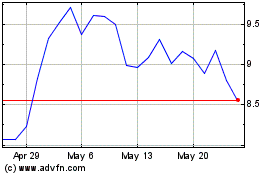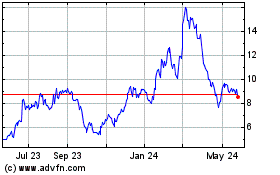ORIC Pharmaceuticals, Inc. (Nasdaq: ORIC), a clinical stage
oncology company focused on developing treatments that address
mechanisms of resistance in cancer, today announced four
preclinical poster presentations at the 2021 American Association
for Cancer Research (AACR) virtual annual meeting on April 10-15,
2021.
“We are pleased to present these compelling preclinical data on
our four product candidates, which continue to validate our
scientific platform focused on overcoming resistance in cancer,”
said Lori Friedman, chief scientific officer. “In particular, we
are encouraged to see our lead program ORIC-101 reversing
GR-mediated resistance in a variety of tumor models and contexts.
Furthermore, ORIC-533, ORIC-944 and ORIC-114 each continue to show
mounting evidence of potential best-in-class differentiation. We
look forward to the continued advancements of these programs and
our discovery research pipeline as we work to improve the lives of
patients with cancer.”
ORIC-101: Glucocorticoid Receptor (GR)
Antagonist
Title: GR antagonist ORIC-101 overcomes
GR-mediated resistance to the combination of AR and AKT inhibition
in preclinical prostate cancer cell linesDate:
Poster release on April 10, 2021 Session: Reversal
of Drug ResistanceAbstract: 1420
ORIC-101 is a potent and selective GR antagonist, with two
distinct mechanisms of action being evaluated in two Phase 1b
trials in combination with: (1) Abraxane (nab-paclitaxel) in
advanced or metastatic solid tumors and (2) Xtandi (enzalutamide)
in metastatic prostate cancer. It has previously been demonstrated
that ORIC-101 reverses GR-mediated resistance to enzalutamide and
to AR degraders in preclinical prostate cancer cell lines. This
preclinical study evaluated whether activated GR confers resistance
to the combination of AKT inhibitors with enzalutamide and whether
co-treatment with ORIC-101 reverses GR-mediated resistance to the
combination. It was observed that GR upregulation and activation,
an established resistance mechanism for antiandrogens, may drive
resistance when antiandrogens are combined with AKT inhibitors, and
our data demonstrated that ORIC-101 was able to overcome this
resistance and restore antitumor activity.
ORIC-533: CD73 Inhibitor
Title: Blocking adenosine production with
ORIC-533, a CD73 inhibitor with best-in-class properties, reverses
immunosuppression in high-AMP environmentsDate:
Poster release on April 10, 2021 Session:
Modifiers of the Tumor MicroenvironmentAbstract:
LB-163
ORIC-533 is a highly potent, orally bioavailable CD73 inhibitor
and has demonstrated greater potency in preclinical studies
compared to an antibody approach and other small molecule CD73
inhibitors. In these studies, nanomolar concentrations of ORIC-533
efficiently rescued cytotoxic T-cell function in the presence of
high AMP concentrations, reflective of levels observed in tumors.
Additionally, inhibitors of adenosine receptors A2A or A2A/B were
only able to rescue CD8+ T-cell function in the context of low
micromolar AMP, thus may be ineffective in tumors with moderate or
high AMP and adenosine levels. These preclinical results indicate
that ORIC-533 has potential best-in-class properties in reversing
immunosuppression in tumors.
ORIC-944: PRC2 Inhibitor
Title: ORIC-944, a potent and selective
allosteric PRC2 inhibitor, demonstrates robust in vivo activity in
prostate cancer modelsDate: Poster release on
April 10, 2021Session: Epigenetic
TargetsAbstract: 1131
ORIC-944 is a potent and selective allosteric inhibitor of
polycomb repressive complex 2 (PRC2) and targets its regulatory
embryonic ectoderm development (EED) subunit. The unique EED
targeting strategy may more completely inhibit PRC2, and may
address certain resistance mutations in EZH2 and the possible
compensatory escape mechanism of EZH1. ORIC-944 has potential
best-in-class drug properties compared to first generation PRC2
inhibitors, and superior in vivo efficacy was observed when
compared to tazemetostat in a DLBCL model. In prostate cancer,
ORIC-944 demonstrated strong tumor growth inhibition as a single
agent with once daily dosing in both enzalutamide-responsive and
enzalutamide-resistant models.
ORIC-114: EGFR/HER2 Inhibitor
Title: ORIC-114, a brain penetrant, orally
bioavailable, irreversible inhibitor selectively targets EGFR and
HER2 exon20 insertion mutants and regresses intracranial NSCLC
xenograft tumors Date: Poster release on April 10,
2021 Session: Tyrosine Kinase and Phosphatase
InhibitorsAbstract: 1466
ORIC-114 is a brain penetrant, orally bioavailable, irreversible
inhibitor designed to selectively target EGFR and HER2 with high
potency against exon 20 insertion mutations. Assessment of kinase
panels showed ORIC-114 is highly selective to the EGFR family of
receptors, with superior kinome selectivity compared to other exon
20 inhibitors. ORIC-114 also demonstrated low nanomolar potency
across exon 20 insertion variants in biochemical and cell-based
assays. Regressions were observed in multiple EGFR exon 20
patient-derived xenograft models using once daily oral
administration. Importantly, ORIC-114 displayed superior brain
exposure relative to other compounds targeting exon 20 and
significantly regressed established EGFR-driven intracranial NSCLC
tumors, commensurate with the superior brain exposure of
ORIC-114.
About ORIC Pharmaceuticals, Inc.
ORIC Pharmaceuticals is a clinical stage biopharmaceutical
company dedicated to improving patients’ lives by Overcoming
Resistance In Cancer. ORIC’s lead product candidate, ORIC-101,
is a potent and selective small molecule antagonist of the
glucocorticoid receptor, which has been linked to resistance to
multiple classes of cancer therapeutics across a variety of solid
tumors. ORIC-101 is currently in two separate Phase 1b trials in
combination with (1) Abraxane (nab-paclitaxel) in advanced or
metastatic solid tumors and (2) Xtandi (enzalutamide) in metastatic
prostate cancer. ORIC’s other product candidates include (1)
ORIC-533, an orally bioavailable small molecule inhibitor of CD73,
a key node in the adenosine pathway believed to play a central role
in resistance to chemotherapy- and immunotherapy-based treatment
regimens, (2) ORIC-944, an allosteric inhibitor of the polycomb
repressive complex 2 (PRC2) via the EED subunit, being developed
for prostate cancer, and (3) ORIC-114, a brain penetrant inhibitor
designed to selectively target EGFR and HER2 with high potency
against exon 20 insertion mutations, being developed across
multiple genetically defined cancers. Beyond these four product
candidates, ORIC is also developing multiple precision medicines
targeting other hallmark cancer resistance mechanisms. ORIC has
offices in South San Francisco and San Diego, California. For more
information, please go to www.oricpharma.com.
Cautionary Note Regarding Forward-Looking
StatementsThis press release contains forward-looking
statements as that term is defined in Section 27A of the Securities
Act of 1933 and Section 21E of the Securities Exchange Act of 1934.
Statements in this press release that are not purely historical are
forward-looking statements. Such forward-looking statements
include, among other things, statements regarding the potential
advantages of ORIC’s product candidates and programs, including
potential best-in-class differentiation; plans underlying ORIC-101,
ORIC-533, ORIC-944, ORIC-114 or any other programs; and statements
by the company’s chief scientific officer. Words such as
“believes,” “anticipates,” “plans,” “expects,” “intends,” “will,”
“goal,” “potential” and similar expressions are intended to
identify forward-looking statements. The forward-looking statements
contained herein are based upon ORIC’s current expectations and
involve assumptions that may never materialize or may prove to be
incorrect. Actual results could differ materially from those
projected in any forward-looking statements due to numerous risks
and uncertainties, including but not limited to: risks associated
with the process of discovering, developing and commercializing
drugs that are safe and effective for use as human therapeutics and
operating as an early clinical stage company; ORIC’s ability to
develop, initiate or complete preclinical studies and clinical
trials for, obtain approvals for and commercialize any of its
product candidates; changes in ORIC’s plans to develop and
commercialize its product candidates; the potential for clinical
trials of ORIC-101 or any other product candidates to differ from
preclinical, preliminary or expected results; negative impacts of
the COVID-19 pandemic on ORIC’s operations, including clinical
trials; the risk of the occurrence of any event, change or other
circumstance that could give rise to the termination of ORIC’s
license agreements; ORIC’s ability to raise any additional funding
it will need to continue to pursue its business and product
development plans; regulatory developments in the United States and
foreign countries; ORIC’s reliance on third parties, including
contract manufacturers and contract research organizations; ORIC’s
ability to obtain and maintain intellectual property protection for
its product candidates; the loss of key scientific or management
personnel; competition in the industry in which ORIC operates;
general economic and market conditions; and other risks.
Information regarding the foregoing and additional risks may be
found in the section entitled “Risk Factors” in ORIC’s Quarterly
Report on Form 10-Q filed with the Securities and Exchange
Commission (the “SEC”) on November 5, 2020, and ORIC’s future
reports to be filed with the SEC. These forward-looking statements
are made as of the date of this press release, and ORIC assumes no
obligation to update the forward-looking statements, or to update
the reasons why actual results could differ from those projected in
the forward-looking statements, except as required by law.
Investor Contact:Dominic Piscitelli, Chief
Financial
Officerdominic.piscitelli@oricpharma.cominfo@oricpharma.com
Oric Pharmaceuticals (NASDAQ:ORIC)
Historical Stock Chart
From Oct 2024 to Nov 2024

Oric Pharmaceuticals (NASDAQ:ORIC)
Historical Stock Chart
From Nov 2023 to Nov 2024
